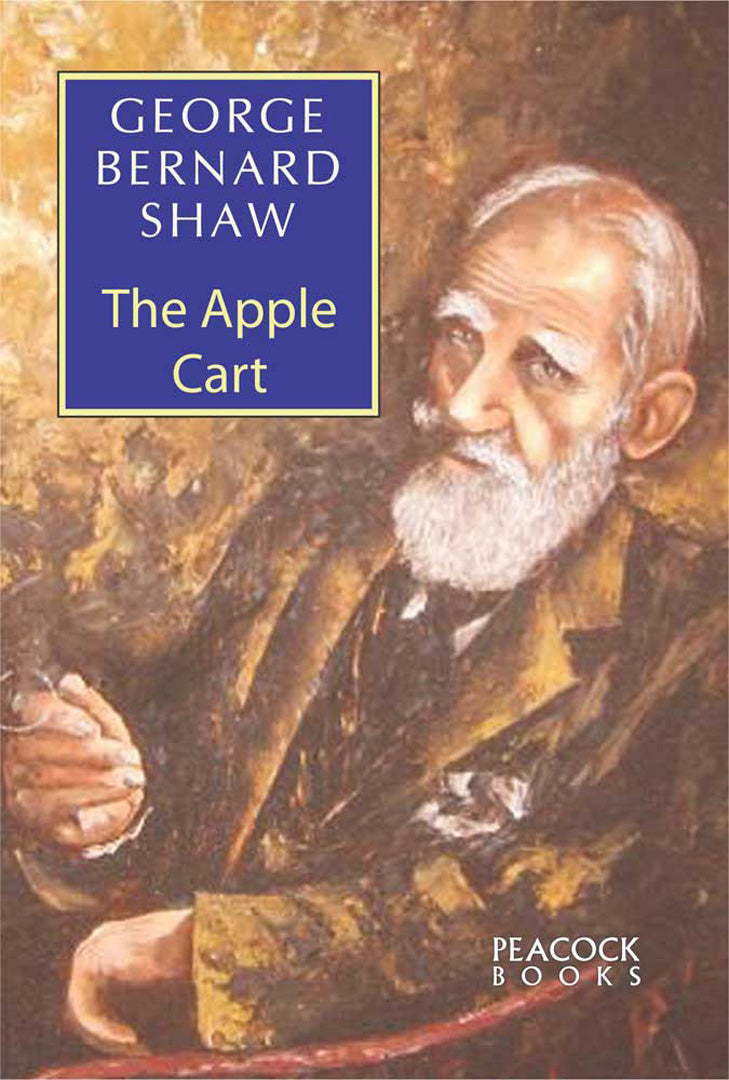The Apple Cart: A Political Extravaganza
The Apple Cart: A Political Extravaganza
George Bernard Shaw
Couldn't load pickup availability
Share

More Information
- ISBN13:
- Publisher: Atlantic Publishers & Distributors (P) Ltd
- Publisher Imprint: Peacock Books
- Publication Date:
- Pages: 132
- Binding:
- Item Weight:
- Original Price:
About The Book
The Apple Cart: A Political Extravaganza, a wry political satire, was completed in December 1928 and first performed in Warsaw (in Polish) in June 1929. Its English premiere was at the first Malvern Drama Festival in August 1929. It is a satirical comedy about several political philosophies which are expounded by the characters, often in lengthy monologues. Its plot concerns a monarch, the fictional English King Magnus, who is assaulted by his elected cabinet. The elected cabinet feels that the king is too meddlesome and threatens to resign if he does not sign an ultimatum, which in effect would strip him of his authority and turn him into a powerless figurehead. Either way, the king would be doomed, without a cabinet or without power—his dilemma is the play’s catalyst. However, the King Magnus spars with, and ultimately outwits, Prime Minister Proteus and his cabinet, who seek to strip the monarchy of its remaining political influence. A political debate starts in which many sides and problems are discussed and revealed. A brief interlude on marriage and adultery, as well as a scene with an American ambassador mocking full democracy and capitalism are also the parts of the political debate. The King Magnus opposes the corporation “Breakages Limited”, which controls politicians and impedes technical progress.
In fact, this play vituperates that any kind of government—democracy, autocracy, and monarchy—are all making the best of a bad situation, and none of them is doing very well. Thus, coupled with Shaw’s astute insight and sparkling wit, the play succeeds brilliantly in exposing the unreality of both democracy and royalty as our idealists conceive them. His adept portrayal of Breakages Limited offers foresight and perspective into the “destruction, waste, and disease” brought by private capitalism that are all too topical today.
About The Author
George Bernard Shaw, (26th July, 1856, Dublin, Ireland—2nd November, 1950, Hertfordshire, England), was an Irish playwright, author, literary critic, political activist, socialist propagandist, and the winner of the Nobel Prize for Literature in 1925. He was the third and youngest child (and only son) of George Carr Shaw and Lucinda Elizabeth Gurly Shaw. Technically, he belonged to the Protestant ascendancy, the landed Irish gentry, but his impractical father was first a sinecure civil servant and then an unsuccessful grain merchant. Therefore, he grew up in an atmosphere of genteel poverty, which to him was more humiliating than being merely poor. At first, he was tutored by his clerical uncle, then he was sent to various schools in Dublin but developed a great dislike for the formalized education systems.
Shaw developed a wide knowledge of music, art, and literature as a result of his mother’s influence and his visits to the National Gallery of Ireland. After working in an estate agent’s office for a while, in 1876, he left for London to join his mother. In London, he established himself as a leading music and theatre critic in the eighties and nineties and became a prominent member of the Fabian Society, for which he composed many pamphlets. With fellow Fabians such as Sidney and Beatrice Webb, he played an important role in the foundation of the London School of Economics (LSE) after receiving private bequests.
Shaw began his literary career as a novelist and as a fervent advocate of the new theatre of Ibsen (The Quintessence of Ibsenism, 1891) he decided to write plays in order to illustrate his criticism of the English stage. By the 1890s, his plays were being performed in London and the income from his plays enabled him to devote his life to writing. Like his contemporary, Oscar Wilde, his plays were popular for their biting wit and humour. His plays were in contrast to many Victorian plays which tended to be sentimental, escapist, and lacking in satire. His earliest dramas were called appropriately Plays Pleasant and Unpleasant (1898). Among these, Widower’s Houses and Mrs. Warren’s Profession savagely attack social hypocrisy, while in plays such as Arms and the Man and The Man of Destiny the criticism is less fierce. His radical rationalism, his utter disregard of conventions, his keen dialectic interest and verbal wit often turn the stage into a forum of ideas.

